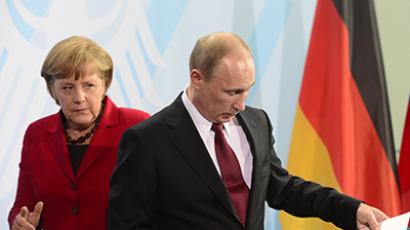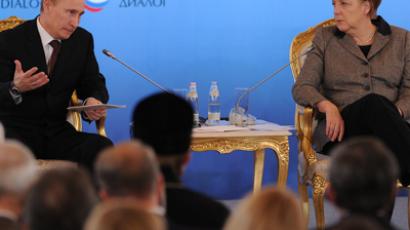Putin’s European blitz: Talking business ties and euro woes
The Russian president has arrived in Germany heading a large delegation to stimulate business ties with crisis-stricken EU countries. Vladimir Putin joined Chancellor Angela Merkel to open the world’s top technology show Hannover Messe.
With US$104 billion of trade turnover in 2012, Germany is undoubtedly Russia’s biggest trade partner in the EU. According to German statistics, the gross trade turnover between the two countries in the last five years totalled $452 billion.
Speaking at the opening event, Putin stressed that Russia is open to “mutually advantageous cooperation.”
"I am confident that Russia's participation as the main partner country of the fair will give a powerful impetus to contacts between Russian and German entrepreneurs, and will encourage new promising joint projects."
“We’re aware of our problems and we’re targeting them purposefully, including the inflation that still remains high,” Putin said, adding that the inflation estimates in Russia this year are over 6 percent.
For her part, Chancellor Merkel stressed that full-fledged cooperation between Germany and Russia needs “active civil society.” Referring to the nationwide inspections of NGOs that have been taking place in Russia she emphasized that they should have “chances.”
“We spoke about this a lot, also in the framework of the St. Petersburg dialogue. And we must intensify this discussion and continue developing our contradictory views,” Merkel added.
Since Hannover Messe (Fair), founded in 1947, is the world’s most important technology show and largest industrial exposition, the destination of the Russian president’s visit to Germany has been predetermined.
This year Russia is the proud holder of ‘major partner country’ status at the event.
Just two days ahead of the visit Russia’s RBC daily reported that there was a ruthless rivalry between participant companies to be included in the route the two leaders will take through the Hannover Fair. Anything touched by the German chancellor and Russia president is sure to get a de facto stamp of approval and unparalleled publicity.
Russian industrial heavyweights and technological centers have united in a single conglomerate of stands that will occupy over 4,500 square meters of the exposition in Hannover. Overall 173 companies, including energy giant Gazprom, the world’s largest public oil company Rosneft, Russian Railways, nanotechnology state corporation Rosnano, state corporation Rostech, technology innovation center Skolkovo and Uralvagonzavod – Russia’s leading military-industrial corporation.
Most of Russia’s top industrial executives, business captains and technocrat billionaires will get to Hannover for at least one day to give remarkable weight to the Russian delegation and accompany the president.
In an interview to German television and radio broadcasting company ARD ahead of the visit, Vladimir Putin named Germany “our primary European partner.”
“The trade pattern is not only in line with its economic capabilities, but also in line with its interests since the emphasis in trade and economic cooperation with Germany is put on industrial production,” Putin said, stressing that Russian-German industrial cooperation creates “thousands, if not tens of thousands, of jobs, and the incomes of Russian and German families.”
Putin recalled that Russia supplies 40 per cent of all natural gas supplies and 30 per cent of all oil consumption in Germany.
Moscow and Berlin are expanding cooperation in high technology
sectors like aviation, engineering, nanotechnology and
next-generation physics scientific research, Putin
revealed.

Last year the Fair was attended by about 200,000 visitors. In 2013 more than 6,500 companies from 60 countries are set to showcase technological achievements and get new contracts and ties.
Over the years German business invested nearly $25 billion into the Russian economy, yet events like Hannover Messe are conducted exactly for that reason - to make mutual investments growing and get economies’ interacting on a new level.
Chancellor Angela Merkel is expected to return an official visit in summer, attending the St. Petersburg Economic Forum on June 20-21.
The next stop for Putin will be the Netherlands capital, Amsterdam, where some 15 large-scale economic documents, including in the gas and oil spheres, are expected to be signed.
Even more important, Vladimir Putin and Netherlands Prime
Minister Mark Rutte will put a start to the ‘Year of the
Netherlands in Russia’ and vice versa. This will include over 350
cultural projects, like concerts, theater tours and expositions
that two countries will exchange in 2013-2014.














